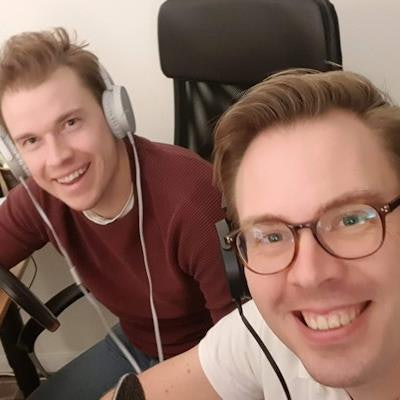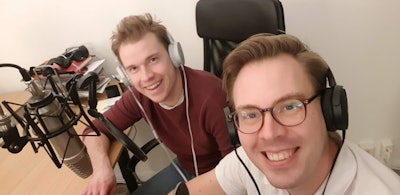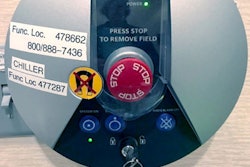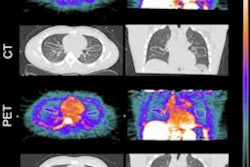
What do Swedes do for fun? Skiing or hiking might come to mind, but two radiologists are dedicating their free time to a professional podcast with equipment that they have bought themselves.
Dr. Per Hintze and Dr. Jörgen Strömberg met as residents at the hospital in Eksjö, in the south of Sweden. They founded the podcast "Röntgenpodden" (Spotify, SoundCloud) three years ago after Strömberg mentioned the idea while the two were having lunch at a local restaurant.
 Drs. Per Hintze (left) and Jörgen Strömberg love to record podcasts in their free time.
Drs. Per Hintze (left) and Jörgen Strömberg love to record podcasts in their free time."After Jörgen started working remotely we did not meet very often. Starting a podcast was -- and still is -- a popular phenomenon and it seemed to be a fun way of spending time together," Hintze told AuntMinnieEurope.com. "Radiology felt like a good topic because that's what we do. To the best of our knowledge, we are the first in our country nerdy enough to make a radiology podcast."
Strömberg and Hintze, who have been radiologists for respectively 13 and 11 years, had no previous experience of producing a podcast or any other digital media. Airing the podcast is limited to when the two of them have time so there is no fixed schedule. There is also no external funding, and they use equipment that Strömberg bought himself and record in various locations.
"Although some funding could be nice, at the moment we record whatever we want, whenever we want to do it, depending on how much time we have and how many interesting topics we find to discuss," Hintze said.
But how do they find the subjects?
"In some episodes, we discuss a 'zebra' -- a case of some unusual pathology one of us has come across," Hintze noted. "Sometimes we challenge our listeners to make a diagnosis by posting single pictures from these cases on social media. People seem to like that kind of interaction and our listeners' feedback is generally positive."
In addition, listeners contact the team through social media with suggestions for specific topics, but most often the two find the themes themselves. They also listen to other podcasts, including RadCast and the radiology podcast of the RSNA, for an update on topics covered there.
A date with Paul McCoubrie...
Hintze and Strömberg review scientific articles, and sometimes interview the authors, but they also try to cover news in the world of radiology -- specifically Sweden.
"We try to sound professional yet not too formal. People like Dr. Paul McCoubrie are a great source of inspiration," noted Hintze, referring to their interview with AuntMinnnieEurope.com's regular columnist that went live on 12 August 2022.
Beyond Sweden, the podcast has a "handful" of listeners in Norway. Before interviewing McCoubrie, they recorded episodes in Swedish only, though there might be more episodes in English in the future, depending on the interviewees. The pair also pointed to how the podcast has generated live and online courses on various subjects.
A major turning point was meeting Dr. Malin Zimmerman, an orthopedic surgeon producing a podcast of her own, "Ortopodden," the team noted. They made a podcast episode together and since then, the three have been holding online and live lectures and teaching orthopedic residents and general practitioners the basics of emergency skeletal radiology.
Along with some former colleagues, the pair will also hold a week-long course in emergency radiology later this month for junior residents. Hintze and Strömberg held two similar online emergency imaging courses on Zoom during the pandemic, with 40 participants each time, but this was the duo's first live course on the topic, held in Eksjö from 26 to 30 September.
Coverage of annual congress
Strömberg and Hintze both attended Röntgenveckan, Sweden's annual radiology meeting, held in Gothenberg from 12 to 16 September 2022. They made recordings about some of the themes that were discussed there, such as the debate on changing the title of technicians from "radiological nurse" to "radiographer," which featured in an episode that aired on 10 October.
This might sound like a fairly minor issue, but the discussions have been pretty fierce, noted the team.
"Although some of our radiologist colleagues have strong feelings on the matter, discussions on our social media channels suggest this topic attracts more attention from the radiological nurses/radiographers," Hintze said. "One reason for the vehemence of the debate is probably that the process has been quite slow so far, and some feel that the issue hasn't been pushed hard enough by their union and other professional organizations."
Another hot topic at the conference was artificial intelligence-assisted detection of incidental pulmonary embolism in oncologic patients, which will be covered in a future podcast.



















